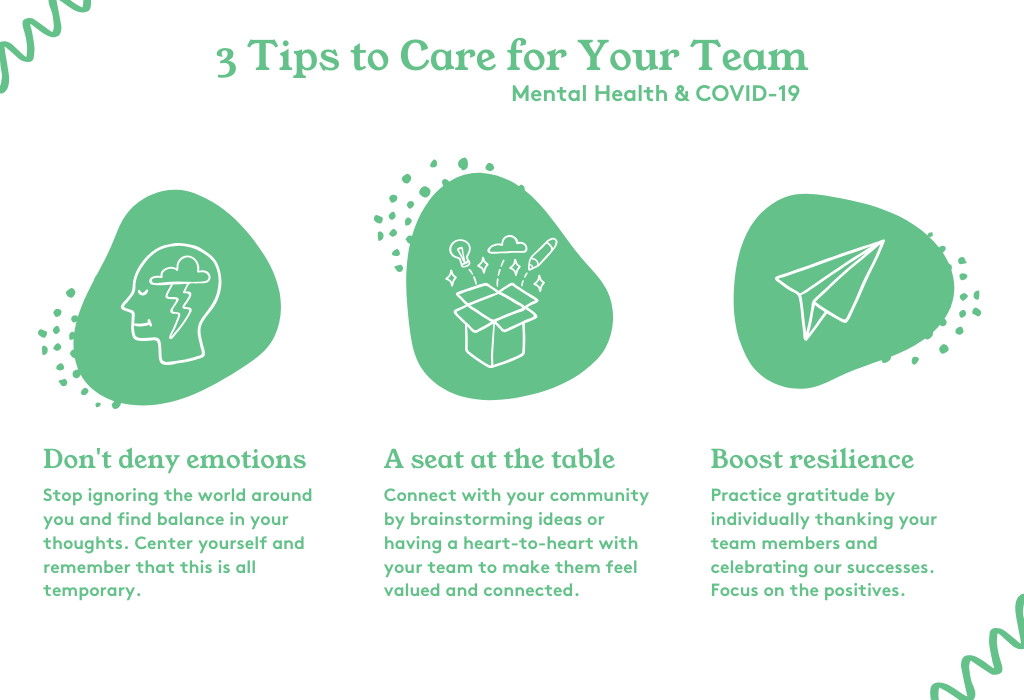Mental Health and COVID-19: 3 Tips to Care for Your Team
Between stress and fear, people across the country are struggling with more than just COVID-19. It’s an unprecedented time in our country’s history, which has led to mental health challenges particularly for those on the frontlines. We can help alleviate these challenges. We can help people cope with stress, by building stronger individuals, teams, and communities.
In healthcare, foodservice plays a vital role in the health and recovery of patients, but in a time of crisis, we need to put additional emphasis on the wellness of our team members. By making a concerted effort to care for individuals, managers have an opportunity to make a measurable impact on the mental health of our teams.
While everyone deals with stress differently, here are three tips to care for your team’s mental health:
Don’t Deny Emotions
People are feeling a range of emotions from personal fear to professional doubt. We must embrace that in the workplace and acknowledge it. Denying our emotions or bottling them up, will only lead to difficulty down the road.
In many respects, the emotion many people feel is akin to grief. As a result, the Harvard Business Review wrote an article with David Kessler, an expert on grief who has three decades of healthcare experience.
“We’re feeling a number of different griefs,” said Kessler in the Harvard Business Review interview. “We feel the world has changed, and it has. We know this is temporary, but it doesn’t feel that way, and we realize things will be different.”
To best address this grief, we can’t ignore the world around us, said Kessler. It won’t go away. The goal should be to find balance in your thoughts. If you start thinking too negatively, center yourself and remember this is temporary. Remind yourself and your team daily that this is not the new normal, even if it may seem like it at times.
This is a time to overprotect, not overreact.
A Seat at the Table
It’s a time of great distress for many. With it comes a sense of helplessness. As a manager, you can help give your staff a sense of control by granting them a seat at the table.
A few ideas of how to integrate your teams into the decision-making process:
- Brainstorms—Your team members have great ideas and a potentially different view of the situation. Not only will you gain valuable insight into the business and the current landscape, but you will also see their spirits rise. By acknowledging their ideas and thoughts, you will create a powerful community that feels connected and valued.
- One-on-One Meetings/Conversations—Check on your people. Have conversations. Find out what they think of the current situation and how it impacts their role. It can be a powerful validation point for a team member to know that their manager has taken the time to seek them out and discuss the situation. These conversations don’t have to be done in-person. In light of social distancing guidelines, these meetings can also be held remotely via phone or email.
When having a conversation with your team members, there are truly only three things you need to address:
- What’s working well?
- What do you need?
- Say thank you.
If you are able to get those points across, your team will feel connected and valued.

Boost Resilience
With so much stress in healthcare organizations, burnout is a real concern. To best boost the resilience of our teams, we need to make targeted efforts to safeguard their mental health. According to J. Bryan Sexton, associate professor in psychiatry and behavioral sciences at Duke’s School of Medicine, there are three ways to increase resilience:
- Three Good Things—Humans typically remember the negative aspects of their day. This can easily be changed. During rounding or huddle meetings, ask your team members to each name three good things. It’s a simple exercise that puts positive emotions and experiences in the forefront.
- Gratitude—Gratitude is a powerful tool. It doesn’t cost anything, but it can build culture and position a team for success. As a manager, take a couple of minutes and write a personal note/email to each team member. By thanking them for their sacrifices and hard work, you will let them know they are valued members of the team and making a difference for the organization.
- Celebrate Success—Sexton refers to this as Rediscovering Awe, but in truth, it’s a little more than that. We need to look at the amazing work our teams are doing and celebrate. This can take many forms but make sure everyone feels appreciated, knows the value of their work, and realizes how it impacts patients.
It’s a difficult time for everyone. As leaders, we need to embrace compassion and put our people and patients first. With these tips, you have the ammunition to create a positive environment for your team and safeguard their mental health.
For more tips on mental health and foodservice best practices during the COVID-19 outbreak, visit Morrison Healthcare’s COVID-19 Resource Center.




